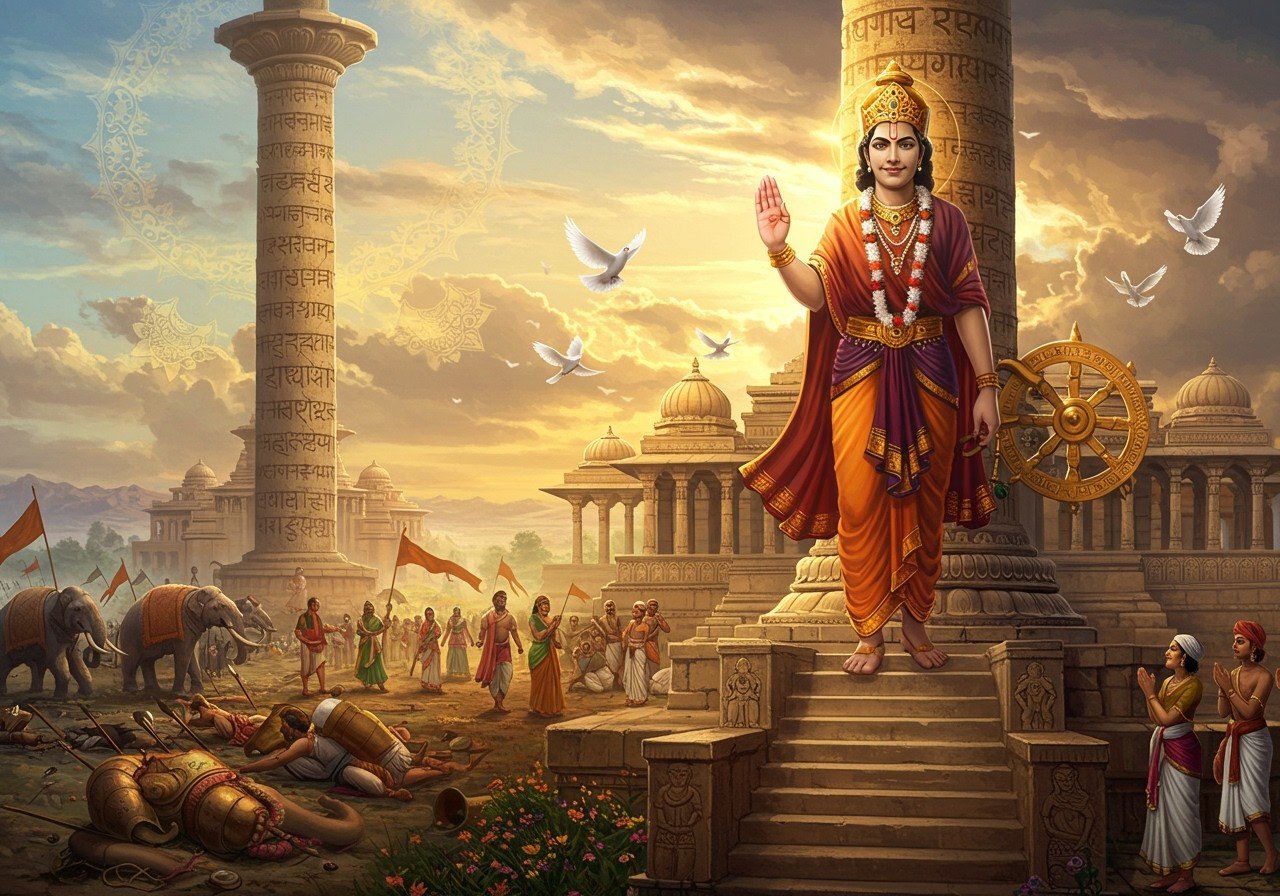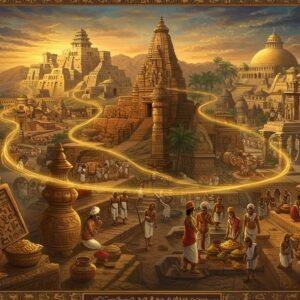
Ashoka the Great, a prominent emperor of the Maurya Dynasty, transformed from a fierce conqueror to a compassionate leader. His Dhamma, or Dharma, reflects his vision of ethical governance and societal harmony. This blog delves into the principles of Ashoka’s Dhamma, its dissemination, and its impact on society.
What was Ashoka’s Dhamma?
Ashoka’s Dhamma was a moral code emphasizing non-violence, tolerance, and ethical conduct. Inspired by Buddhism but encompassing all faiths, its core principles included:
- Ahimsa (non-violence): This principle went beyond simply avoiding physical harm. It encompassed a deep respect for all living beings and a commitment to peaceful conflict resolution.
- Respect for all life: Ashoka’s Dhamma encouraged kindness and compassion not just towards humans but also towards animals. He established animal sanctuaries and promoted vegetarianism.
- Compassion: Showing empathy and care for others, particularly those less fortunate, was central to Ashoka’s Dhamma. He established hospitals and provided aid to those in need.
- Truthfulness: Honesty and integrity in all actions were essential components of Ashoka’s Dhamma. He believed that trust and transparency were crucial for a just society.
- Tolerance: Respecting diverse beliefs and practices was a cornerstone of Ashoka’s Dhamma. He encouraged religious harmony and forbade persecution based on faith.
Ashoka’s Dhamma also stressed the well-being of his subjects and animals, promoting social harmony and ethical behavior. It encouraged respect for elders, generosity towards the poor, and humane treatment of prisoners.
How did Ashoka spread Dhamma?
Ashoka employed various methods to propagate his Dhamma:
- Edicts on pillars and rocks: These inscriptions, carved in local languages, communicated his principles across the Indian subcontinent. They served as public declarations of his commitment to Dhamma.
- Dhamma Mahamatras: These officials were appointed to oversee ethical policies and ensure public welfare. They acted as administrators and enforcers of Ashoka’s Dhamma.
- Emissaries and missionaries: Ashoka sent emissaries to neighboring kingdoms and missionaries to distant lands like Sri Lanka and Central Asia to spread his teachings of peace and non-violence.
- Public gatherings and festivals: These events provided opportunities to educate people about Dhamma and promote its adoption. They fostered a sense of community and shared values.
- Support for Buddhist structures: Ashoka built stupas and viharas to facilitate moral education and the spread of Buddhist principles, which aligned with his Dhamma.
Ashoka actively promoted Dhamma through his actions, setting an example for his subjects. His patronage significantly contributed to Buddhism’s transformation into a major world religion.
Why did Ashoka give up war?
The Kalinga War (around 261 BCE) was a pivotal moment in Ashoka’s life. The immense loss of life and suffering deeply affected him, leading to remorse and a realization of the futility of violence. This prompted him to embrace Buddhism and renounce further military conquest.
- Personal and political conversion: The Kalinga War led to a profound change in Ashoka’s worldview. He embraced Buddhism and sought to rule through moral authority rather than military might.
- Unified diverse empire: Ashoka aimed to unite his vast and diverse empire under a common ethical framework, using Dhamma as a unifying force.
- Focused on peace and prosperity: After the Kalinga War, Ashoka shifted his focus from conquest to the welfare of his people, prioritizing peace and prosperity.
His commitment to Dhamma marked a significant shift in governance towards ethical conduct.
Impact of Ashoka’s Dhamma
Ashoka’s Dhamma profoundly influenced society during and after his reign. His principles fostered a culture of ethical governance and social welfare that resonated deeply with his subjects. By promoting non-violence, social harmony, and religious tolerance, Ashoka’s Dhamma paved the way for significant societal transformations.
Ethical Governance
Ashoka’s approach to ruling was revolutionary for his time. He prioritized the well-being of his subjects over territorial expansion.
- Public Welfare: Ashoka initiated public welfare projects, including hospitals for humans and animals, roads, and rest houses, demonstrating his commitment to the well-being of his people. These initiatives improved the lives of his subjects and fostered a sense of community.
- Justice and Fairness: He implemented measures to ensure fair and just treatment of his subjects by officials. He established systems for addressing grievances and providing assistance to those in need.
Spread of Buddhism
Ashoka’s support played a crucial role in the spread of Buddhism across Asia.
- Missionary Work: He sent Buddhist missionaries to various regions, including Sri Lanka, Central Asia, and the Mediterranean, disseminating Buddhist teachings and promoting its adoption. This missionary work contributed significantly to the growth of Buddhism beyond India’s borders.
- Building Monuments: Ashoka commissioned the construction of numerous Buddhist monuments, including stupas and viharas, making Buddhism more accessible and visible to the populace. These monuments served as centers of learning and spiritual practice.
Social Transformation
Ashoka’s Dhamma encouraged societal changes that promoted ethical living.
- Agricultural Shift: Hunters and fishermen were encouraged to adopt agricultural practices, reducing harm to animals and promoting a more sustainable lifestyle. This transition contributed to economic stability and reduced reliance on hunting and fishing.
- Animal Welfare: Ashoka implemented policies to protect wildlife, including banning animal sacrifices and promoting vegetarianism. He established animal sanctuaries and advocated for compassionate treatment of animals.
Lasting Legacy
Although Ashoka’s Dhamma did not survive long after his reign (around 232 BCE), its influence is still evident today. His emphasis on non-violence inspired leaders like Mahatma Gandhi.
Historical Significance
Ashoka’s edicts, inscribed on pillars and rocks, are invaluable historical records, offering insights into ancient governance and ethical practices. They showcase Ashoka’s commitment to Dhamma.
Poojn.in: Supporting Your Journey with Ashoka’s Dhamma
Poojn.in, India’s leading cultural goods and services store, offers a wide selection of products that can enrich your understanding and practice of Ashoka’s Dhamma. Explore these offerings to connect with the principles of peace, non-violence, and spiritual growth:
- Ashoka Chal Powder: Use this pure, natural powder in traditional ceremonies and rituals, connecting with the symbolism of the Ashoka tree.
- Ashoka Bark: Incorporate Ashoka bark into your spiritual practices, drawing upon its traditional significance.
- Meditation Cushions and Asanas: Enhance your meditation practice with comfortable and supportive cushions and asanas, fostering inner peace and mindfulness.
- Incense Sticks: Create a serene atmosphere with fragrant incense sticks, promoting tranquility and focus during meditation or prayer.
Visit Poojn.in to discover a wide range of products that support your spiritual journey. We offer secure online shopping and convenient doorstep delivery across India.
Conclusion
Ashoka’s Dhamma exemplifies the transformative power of ethical governance and compassionate leadership. His principles of non-violence, social harmony, and religious tolerance continue to inspire us today. Ashoka’s journey from conqueror to benevolent ruler demonstrates the profound impact of kindness and moral leadership.
Understanding Righteous Living and Its Principles


